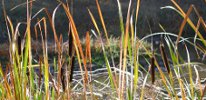
Training
Working Together to Get Things Done: Module 1
This workshop provided an overview of Collaborative Learning, a rigorous methodology for sharing knowledge and expertise, building effective partnerships, designing and implementing research, and getting things done in complex systems like natural resource management. This overview served as a stand-alone module, or participants could choose to go on to participate with the 1.5 day "Module 2" immediately following this session.
COST: $25.00
Payable by check to Elkhorn Slough Foundation
Payable by credit card (online)
REGISTRATION FOR THIS PROGRAM IS CLOSED
Instructor Information
Dr. Chris Feurt
Director,Center for Sustainable Communities Depart
University of New England
Contact
Grey Hayes
grey@elkhornslough.org
(831) 274-8700
Sponsors
Description
See also: Working Together To Get Things Done, Sustainable Human Systems
What is the Training?
”Working Together to Get Things Done” was a two-part training that built participant capacity to work with people who have different priorities, viewpoints, and knowledgein order to achieve resource managementgoals. This webpage features "Module 1"...click here for registration information for "Module 2."
This first half-day module, "Module 1," provided an overview of Collaborative Learning, a rigorous methodology for sharing knowledge and expertise, building effective partnerships, designing and implementing research, and getting things done in complex systems like natural resource management. Module 1 was appropriate for anyone who might participate in a collaborative project at any level and helped particiapnts:
- Understand the principles that underpin Collaborative Learning;
- Understand the four basic steps of the Collaborative Learning process;
- Articulate the benefits of applying Collaborative Learning to familiar situations;
- Identify opportunities for, and barriers to, the use of Collaborative Learning in your work;
- Identify your role in a Collaborative Learning process.
Documents and Publications
Contact List
We encourage participants to download the contact list to assist with arranging a rideshare or to get in contact with someone you met at the
workshop. Those interested in sharing a ride to the event are marked on the contact list.
| DOCUMENT | AUTHOR / SOURCE |
|---|---|
| OTHER INFORMATION | |
| Collaborative Learning Guide for Ecosystem Management PDF, 4.6MB |
Dr. Christine Feurt CICEET and the Wells Reserve 2008 |
Questions and Answers
Submit a question on this subject and we'll provide an answer. coastaltraining@elkhornsloughctp.org
